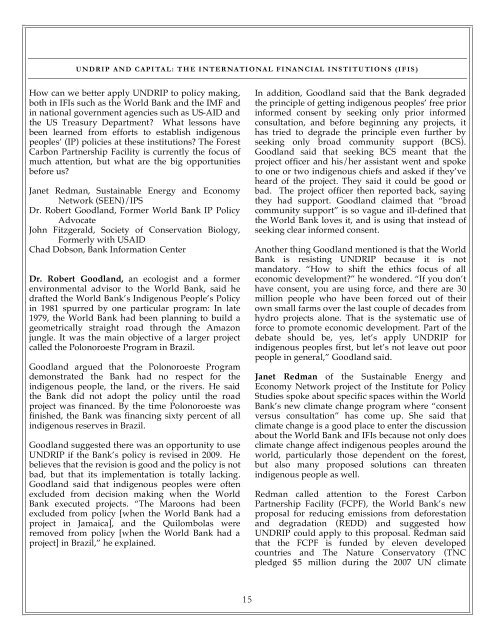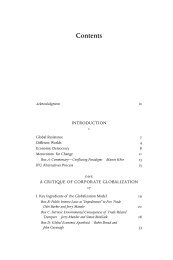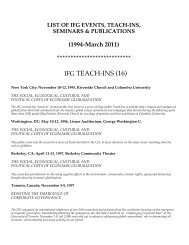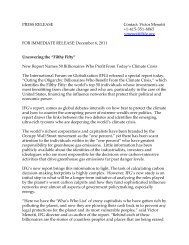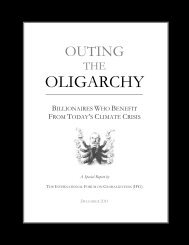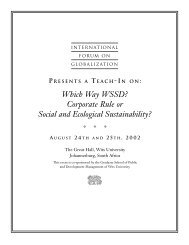UNDRIP Report - English FINAL - International Forum on Globalization
UNDRIP Report - English FINAL - International Forum on Globalization
UNDRIP Report - English FINAL - International Forum on Globalization
You also want an ePaper? Increase the reach of your titles
YUMPU automatically turns print PDFs into web optimized ePapers that Google loves.
UN DRIP A ND C API TA L: THE I N TER NA TI O NA L FI NA N CIAL I NS TI TUTIONS (IFIS )<br />
How can we better apply <str<strong>on</strong>g>UNDRIP</str<strong>on</strong>g> to policy making,<br />
both in IFIs such as the World Bank and the IMF and<br />
in nati<strong>on</strong>al government agencies such as US-AID and<br />
the US Treasury Department? What less<strong>on</strong>s have<br />
been learned from efforts to establish indigenous<br />
peoples’ (IP) policies at these instituti<strong>on</strong>s? The Forest<br />
Carb<strong>on</strong> Partnership Facility is currently the focus of<br />
much attenti<strong>on</strong>, but what are the big opportunities<br />
before us?<br />
Janet Redman, Sustainable Energy and Ec<strong>on</strong>omy<br />
Network (SEEN)/IPS<br />
Dr. Robert Goodland, Former World Bank IP Policy<br />
Advocate<br />
John Fitzgerald, Society of C<strong>on</strong>servati<strong>on</strong> Biology,<br />
Formerly with USAID<br />
Chad Dobs<strong>on</strong>, Bank Informati<strong>on</strong> Center<br />
Dr. Robert Goodland, an ecologist and a former<br />
envir<strong>on</strong>mental advisor to the World Bank, said he<br />
drafted the World Bank’s Indigenous People’s Policy<br />
in 1981 spurred by <strong>on</strong>e particular program: In late<br />
1979, the World Bank had been planning to build a<br />
geometrically straight road through the Amaz<strong>on</strong><br />
jungle. It was the main objective of a larger project<br />
called the Pol<strong>on</strong>oroeste Program in Brazil.<br />
Goodland argued that the Pol<strong>on</strong>oroeste Program<br />
dem<strong>on</strong>strated the Bank had no respect for the<br />
indigenous people, the land, or the rivers. He said<br />
the Bank did not adopt the policy until the road<br />
project was financed. By the time Pol<strong>on</strong>oroeste was<br />
finished, the Bank was financing sixty percent of all<br />
indigenous reserves in Brazil.<br />
Goodland suggested there was an opportunity to use<br />
<str<strong>on</strong>g>UNDRIP</str<strong>on</strong>g> if the Bank’s policy is revised in 2009. He<br />
believes that the revisi<strong>on</strong> is good and the policy is not<br />
bad, but that its implementati<strong>on</strong> is totally lacking.<br />
Goodland said that indigenous peoples were often<br />
excluded from decisi<strong>on</strong> making when the World<br />
Bank executed projects. “The Maro<strong>on</strong>s had been<br />
excluded from policy [when the World Bank had a<br />
project in Jamaica], and the Quilombolas were<br />
removed from policy [when the World Bank had a<br />
project] in Brazil,” he explained.<br />
In additi<strong>on</strong>, Goodland said that the Bank degraded<br />
the principle of getting indigenous peoples’ free prior<br />
informed c<strong>on</strong>sent by seeking <strong>on</strong>ly prior informed<br />
c<strong>on</strong>sultati<strong>on</strong>, and before beginning any projects, it<br />
has tried to degrade the principle even further by<br />
seeking <strong>on</strong>ly broad community support (BCS).<br />
Goodland said that seeking BCS meant that the<br />
project officer and his/her assistant went and spoke<br />
to <strong>on</strong>e or two indigenous chiefs and asked if they’ve<br />
heard of the project. They said it could be good or<br />
bad. The project officer then reported back, saying<br />
they had support. Goodland claimed that “broad<br />
community support” is so vague and ill-defined that<br />
the World Bank loves it, and is using that instead of<br />
seeking clear informed c<strong>on</strong>sent.<br />
Another thing Goodland menti<strong>on</strong>ed is that the World<br />
Bank is resisting <str<strong>on</strong>g>UNDRIP</str<strong>on</strong>g> because it is not<br />
mandatory. “How to shift the ethics focus of all<br />
ec<strong>on</strong>omic development?” he w<strong>on</strong>dered. “If you d<strong>on</strong>’t<br />
have c<strong>on</strong>sent, you are using force, and there are 30<br />
milli<strong>on</strong> people who have been forced out of their<br />
own small farms over the last couple of decades from<br />
hydro projects al<strong>on</strong>e. That is the systematic use of<br />
force to promote ec<strong>on</strong>omic development. Part of the<br />
debate should be, yes, let’s apply <str<strong>on</strong>g>UNDRIP</str<strong>on</strong>g> for<br />
indigenous peoples first, but let’s not leave out poor<br />
people in general,” Goodland said.<br />
Janet Redman of the Sustainable Energy and<br />
Ec<strong>on</strong>omy Network project of the Institute for Policy<br />
Studies spoke about specific spaces within the World<br />
Bank’s new climate change program where “c<strong>on</strong>sent<br />
versus c<strong>on</strong>sultati<strong>on</strong>” has come up. She said that<br />
climate change is a good place to enter the discussi<strong>on</strong><br />
about the World Bank and IFIs because not <strong>on</strong>ly does<br />
climate change affect indigenous peoples around the<br />
world, particularly those dependent <strong>on</strong> the forest,<br />
but also many proposed soluti<strong>on</strong>s can threaten<br />
indigenous people as well.<br />
Redman called attenti<strong>on</strong> to the Forest Carb<strong>on</strong><br />
Partnership Facility (FCPF), the World Bank’s new<br />
proposal for reducing emissi<strong>on</strong>s from deforestati<strong>on</strong><br />
and degradati<strong>on</strong> (REDD) and suggested how<br />
<str<strong>on</strong>g>UNDRIP</str<strong>on</strong>g> could apply to this proposal. Redman said<br />
that the FCPF is funded by eleven developed<br />
countries and The Nature C<strong>on</strong>servatory (TNC<br />
pledged $5 milli<strong>on</strong> during the 2007 UN climate<br />
15


